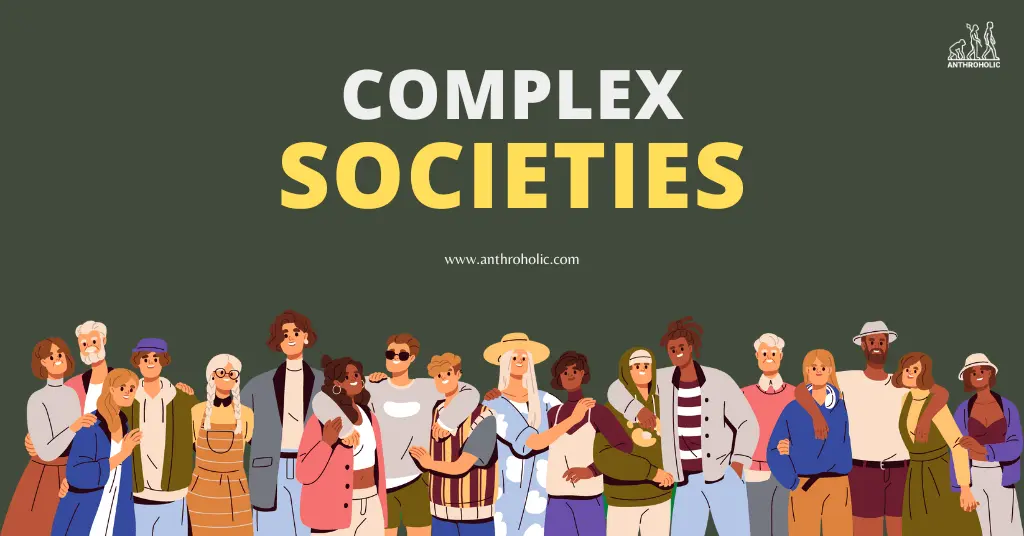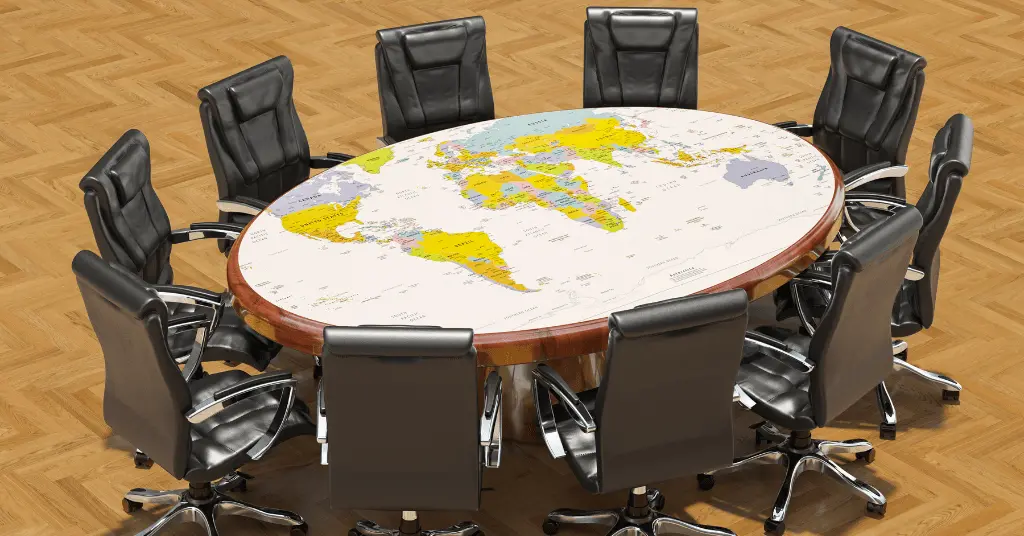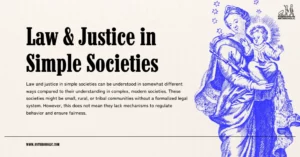AI Answer Evaluation Platform Live Now. Try Free Answer Evaluation Now
Complex Societies
Complex Societies are the pinnacle of human civilization, characterised by intricate social, political, economic, and Cultural systems that have emerged throughout history. These societies represent a significant stage of human development, offering valuable insights into the diverse ways in which Humans have organised themselves and interacted within their environments. In this subsection, we will define complex societies and explore their significance in Anthropology, shedding light on key themes that contribute to their complexity.

Complex Societies can be defined as human civilizations that exhibit advanced forms of social organisation, often characterised by centralised governance, social stratification, division of labour, technological Advancements, and cultural institutions. They are marked by intricate social structures that determine individuals’ roles, responsibilities, and status within the society.
The significance of studying Complex societies lies in the understanding of how humans have adapted to their environments, created social structures, and developed systems to meet their needs and aspirations. By exploring historical development, Social organisation, economic systems, political structures, cultural practices, and patterns of interaction within complex societies, we gain a Deeper understanding of human potential, achievements, and challenges throughout time.
The main themes to be discussed in this subsection include:
- Historical Development: Examining the processes and factors that led to the Emergence and evolution of complex societies, including the transition from hunter-gatherer societies to agricultural civilizations.
- Social Organization: Analysing the Hierarchical structures, social classes, and systems of social stratification within complex societies, exploring the dynamics of power, social mobility, and Social cohesion.
- Economic Systems: Investigating the economic organisation of Complex Societies, including the division of labour, trade networks, agricultural practices, and the development of market economies.
- Political Structures: Understanding the Political institutions, governance systems, and Power dynamics within Complex societies, including the rise of states, empires, and the exercise of authority.
- Cultural Practices: Exploring the Cultural beliefs, Religious rituals, artistic expressions, intellectual traditions, and social norms that shape the identity and worldview of complex societies.
- Interactions and Exchange: Examining the networks of communication, trade routes, cultural diffusion, and diplomatic relations that facilitate interactions among complex societies.
By Synthesising research from scholarly works and credible sources, this sub-section aims to provide a Comprehensive understanding of complex societies and their multidimensional nature.
Historical Context
The historical development of Complex societies is a fascinating journey that spans thousands of years, Encompassing key transitions and the rise and fall of influential civilizations. This condensed overview explores the major milestones and shifts that have shaped the emergence and evolution of complex societies.
One crucial transition was the shift from hunter-gatherer Societies to settled agricultural communities, which marked a significant turning point in human history. This agricultural revolution, occurring independently in various regions such as the Fertile Crescent, China, Mesoamerica, and the Andes, led to the establishment of permanent settlements and the domestication of plants and animals. With Agriculture providing a reliable food supply, populations grew, allowing for the development of more complex social structures.
- In Mesopotamia, the Sumerians created one of the earliest complex societies, with city-states such as Uruk and Ur emerging around 4000 BCE. These city-states featured monumental architecture, extensive trade networks, and early forms of writing.
- Another influential civilization was Ancient Egypt, with its centralised political system, Elaborate religious beliefs, and monumental construction projects, including the pyramids.
- The Indus Valley Civilization in South Asia, characterised by advanced urban planning, Extensive trade, and a system of writing that remains undeciphered, flourished from 2600 BCE to 1900 BCE.
- In East Asia, the Shang and Zhou Dynasties in China established centralised states and developed sophisticated writing systems, bronze technology, and complex social hierarchies.
- The ancient Greek city-states, including Athens and Sparta, laid the foundation for democratic governance, philosophy, and artistic achievements that would shape Western civilization.
- The Roman Empire, known for its vast territorial expansion, efficient Governance, and engineering marvels such as aqueducts and roads, exerted a profound influence on subsequent societies.
These are just a few examples of the rich tapestry of Complex societies that have left indelible imprints on Human History.
Social Organization
Complex societies are characterised by intricate social structures that reflect hierarchical arrangements, social classes, and systems of social stratification. This section explores the diverse ways in which Social Organisation manifests within Complex societies.

Hierarchical structures are prevalent in Complex Societies, where power and authority are distributed unevenly. These hierarchies often encompass political, economic, and social domains. Political hierarchies may include rulers, nobility, and Bureaucratic officials, while economic hierarchies involve wealthy elites and merchants. Social hierarchies determine an individual’s status and privileges within the society, often based on factors such as wealth, occupation, and lineage.
Social classes represent distinct strata within Complex Societies, with individuals grouped based on their social and economic standing. Classes can vary in terms of access to resources, opportunities, and Social mobility. For example, ancient Roman society consisted of Patricians (wealthy landowners and aristocrats), plebeians (commoners), and Slaves.
Systems of Social stratification further reinforce social divisions within complex societies. Stratification can be based on various factors, including wealth, occupation, education, and birthright. The caste system in ancient India, for instance, categorised Individuals into distinct social groups with limited mobility between them.
Understanding social Organisation in complex societies requires Examining kinship structures, gender roles, and social norms. Kinship systems establish relationships based on family ties, while Gender roles determine the rights and responsibilities of individuals based on their Biological sex. Social norms, on the other hand, dictate expected behaviours and interactions within the Society.
Economic Systems
The evolution of economic systems within complex societies has witnessed significant changes, influenced by factors such as the division of labour, technological advancements, and innovation. This Section delves into the transformative nature of Economic systems throughout history.
The division of labour plays a crucial role in complex societies, allowing for specialisation and increased productivity. As societies grew more complex, individuals began to specialise in specific occupations, such as farming, craftsmanship, trade, or administration. This specialisation led to the Development of interdependence among different sectors of the Economy and facilitated the growth of urban centres.
Technological advancements and innovation have been instrumental in shaping economic systems. The adoption of new tools, Techniques, and technologies revolutionised production processes, improving efficiency and expanding economic possibilities. Examples include the invention of the plough, the utilisation of irrigation systems, the development of Manufacturing Techniques, and the utilisation of advanced machinery in industrialised Societies.
In ancient Mesopotamia, for instance, innovations in agriculture, such as the use of irrigation and the plough, led to increased Agricultural productivity and surplus production. This Surplus allowed for the growth of non-agricultural occupations and the development of trade networks.
The Industrial Revolution in the 18th and 19th Centuries marked a significant turning point in economic systems. The mechanisation of production, fueled by technological innovations, propelled the transition from agrarian economies to industrial economies, transforming societies and paving the way for modern Capitalist systems.
Political Systems
Political structures within complex societies are characterised by various forms of governance, centralised authority, and the exercise of power. This section provides a summary of the diverse Political systems found in Complex Societies throughout history.

Centralised governance is a prominent feature of many complex societies. This form of governance involves a central authority or ruling body that holds power and makes decisions on behalf of the Society. Examples include ancient Empires such as the Roman Empire, with its Centralised bureaucracy and emperor, or the centralised city-states of ancient Greece, where decisions were made by elected officials.
Monarchies have also been prevalent in Complex Societies, where power is concentrated in the hands of a single individual, often with hereditary succession. The pharaohs of ancient Egypt and the emperors of China are prime examples of monarchic political systems.
Some Complex Societies have developed forms of republics or Democracies. Ancient Athens, known for its democratic institutions, allowed citizens to participate in decision-making through voting and public assemblies. The republic of Rome featured elected officials who represented the interests of the Citizens.
The exercise of Power within Complex Societies takes various forms, including political authority, coercion, and the establishment of laws and legal systems. Elites and ruling classes often wielded Power through social, economic, and political means. Religious institutions, such as the papacy in mediaeval Europe, also played a significant role in shaping political power and authority.
Cultural Practices
Cultural practices, beliefs, and values are integral to the fabric of complex societies, shaping social norms, identity formation, and the transmission of knowledge. This section delves into the diverse cultural aspects that characterise Complex Societies and their profound impact.

Religious and Ritual Practices hold significant importance within complex societies. Ancient civilizations like the Egyptians, with their pantheon of gods and elaborate funerary rituals, or the Mayans, known for their ceremonial centres and complex calendar systems, highlight the centrality of religion in cultural practices. These rituals often serve as mechanisms for social cohesion, Community bonding, and the expression of shared beliefs.
Artistic expressions are another hallmark of complex societies, showcasing the creativity and aesthetic sensibilities of their inhabitants. Ancient Greek sculptures, Renaissance paintings, and Islamic architecture are examples of Artistic Achievements that have left indelible imprints on cultural history. These artistic expressions often reflect cultural values, societal ideals, and religious themes.
Intellectual and philosophical traditions also emerge within Complex Societies, fostering the development of knowledge and the exploration of existential questions. Ancient Greek philosophers such as Socrates, Plato, and Aristotle, or Islamic Scholars during the Golden Age of Islam, contributed to the advancement of intellectual and philosophical thought. These traditions shaped disciplines such as Ethics, Metaphysics, and political theory.
Culture plays a pivotal role in social norms, determining acceptable behaviours, values, and customs within a society. It influences gender roles, family structures, and societal expectations. Cultural practices contribute to the construction of individual and collective Identities, providing a sense of belonging and shared heritage.
Interactions and Exchange
Interactions and exchange play a vital role in the development and dynamics of complex societies. Long-distance trade networks, cultural diffusion, and the exchange of ideas and technologies are key factors that shape the Interconnectedness among societies.
Long-distance trade facilitates the movement of goods, resources, and commodities between different regions, Contributing to economic growth and cultural exchange. The Silk Road, connecting East Asia with the Mediterranean, and the Trans-Saharan trade routes are prominent examples of extensive trade networks that fostered connections and the exchange of valuable resources.
Cultural diffusion occurs as Societies come into contact, leading to the spread and adaptation of cultural practices, beliefs, and customs. Through interactions, societies acquire new ideas, technologies, and Artistic styles. The diffusion of Buddhism from India to East Asia and the spread of Islamic civilization across various regions exemplify the influence of cultural diffusion on complex societies.
The exchange of ideas and Technologies allows for innovation and progress. Scientific knowledge, Philosophical concepts, and technological advancements spread through trade routes and scholarly networks. The Islamic Golden Age, marked by the transmission of Greek philosophy, advancements in medicine, and scientific discoveries, exemplifies the impact of idea exchange on societal development.
Challenges And Decline
Complex societies have faced numerous challenges throughout history that have contributed to their decline or collapse. Environmental degradation, Social unrest, economic inequality, and external pressures are among the factors that have posed significant challenges to these Societies.
Environmental degradation has often played a role in the decline of Complex Societies. Deforestation, Soil erosion, and depletion of natural resources can lead to agricultural decline, food shortages, and Ecological imbalances. The collapse of the Mayan civilization, believed to be influenced by environmental stressors, serves as an example of how ecological challenges can contribute to societal decline.
Social unrest, including internal conflicts and Power struggles, has destabilised many complex societies. Class struggles, political rivalries, and social inequalities have led to social fragmentation and weakened governance structures. The fall of the Roman Empire, marked by internal conflicts, corruption, and military challenges, Exemplifies the impact of social unrest on the decline of a complex society.
Economic inequality can also undermine the stability of complex societies. The concentration of wealth and resources in the hands of a few can lead to social tensions, decreased social mobility, and economic stagnation. The French Revolution, driven by Social and economic Inequalities, Illustrates the consequences of such disparities.
External pressures, such as invasions, conquests, or economic disruptions, have often posed significant challenges to complex societies. The Mongol invasions and their impact on various Eurasian civilizations, or the collapse of the Byzantine Empire due to external invasions, demonstrate how external pressures can contribute to the decline of complex societies.
Comparative Perspectives
Comparative analysis plays a crucial role in understanding the development and dynamics of Complex Societies. By examining multiple Complex Societies from different regions and time periods, we gain valuable insights into common patterns, differences, and recurring themes that transcend individual cases.
Comparative analysis allows us to identify similarities in social, political, economic, and cultural aspects across complex societies. By comparing diverse societies, we can discern universal Human behaviours and Societal dynamics, as well as variations shaped by unique Historical and geographical circumstances.
This approach facilitates the identification of factors that contribute to the rise and fall of complex societies. By comparing the challenges, achievements, and adaptations of different Civilizations, we can better understand the impact of environmental factors, Social structures, Economic Systems, and political institutions on the sustainability and resilience of complex societies.
Historical examples such as the comparisons between the Roman Empire and Han Dynasty in China, or the Aztec and Inca empires in the Americas, allow for insightful observations regarding the diverse trajectories, Achievements, and vulnerabilities of complex societies.
Conclusion
Studying complex societies provides us with a deeper understanding of the intricacies of human civilization throughout history. Through this exploration, we have delved into various aspects that define complex societies, including their Historical development, social organisation, economic systems, political structures, cultural practices, and patterns of interaction. By examining these key themes, we gain Valuable insights into the significance of studying complex societies.
Complex societies have played a crucial role in shaping human history and have left lasting legacies. They have showcased remarkable achievements in areas such as governance, Economic organisation, cultural expression, and intellectual traditions. However, they have also faced numerous challenges, including environmental degradation, Social unrest, Economic inequality, and external pressures, which have contributed to their decline or collapse.
Comparative analysis has emerged as a powerful tool in understanding complex societies. By comparing multiple Societies, we can identify common patterns, differences, and underlying factors that contribute to their development and dynamics. This comparative perspective allows us to discern universal aspects of human behaviour and societal structures, while recognizing the unique Historical and cultural contexts that shape each society.
Studying complex Societies not only expands our knowledge of the past but also offers valuable insights into contemporary societal challenges. By analysing the successes and failures of complex Societies, we can learn important lessons for addressing issues such as Social Inequality, environmental sustainability, and governance in today’s world.
In conclusion, the study of complex Societies provides us with a rich tapestry of Human experiences, achievements, and challenges. By delving into their complexities, we gain a deeper appreciation for the diverse ways in which humans have organised themselves, interacted with their Environments, and shaped the course of history.
FAQs about Complex Socities
References
- Diamond, J. (1997). Guns, Germs, and Steel: The Fates of Human Societies. W.W. Norton & Company.
- Service, E. R. (1975). Origins of the State and Civilization: The Process of Cultural Evolution. W.W. Norton & Company.
- Trigger, B. G. (2003). Understanding Early Civilizations: A Comparative Study. Cambridge University Press.
- Wenke, R. J., & Olszewski, D. I. (2007). Patterns in Prehistory: Humankind’s First Three Million Years. Oxford University Press. https://www.researchgate.net/publication/272490976_Patterns_in_Prehistory_Humankind’s_First_Three_Million_Years
- Bulliet, R. W. (2015). The Earth and Its Peoples: A Global History (6th ed.). Cengage Learning.
- Childe, V. G. (1950). The Urban Revolution. Town Planning Review, 21(1), 3-17.
- Weber, M. (1946). Class, Status, Party. In H. H. Gerth & C. Wright Mills (Eds.), From Max Weber: Essays in Sociology (pp. 180-195). Oxford University Press.
- Yoffee, N., & Cowgill, G. L. (1988). The Collapse of Ancient States and Civilizations. University of Arizona Press.
- Lenski, G. E., Nolan, P., & Lenski, J. (1991). Human Societies: An Introduction to Macrosociology. McGraw-Hill Education.
- Fagan, B. M. (2005). Ancient Lives: An Introduction to Archaeology and Prehistory. Pearson Prentice Hall.
- Hobsbawm, E. J. (1999). Industry and Empire: From 1750 to the Present Day. The New Press.
- Kuznets, S. (1955). Economic Growth and Income Inequality. The American Economic Review, 45(1), 1-28.
- Mokyr, J. (2010). The Enlightened Economy: An Economic History of Britain, 1700-1850. Yale University Press.
- Nelson, R. R., & Winter, S. G. (1982). An Evolutionary Theory of Economic Change. Harvard University Press.
- Garnsey, P., Morris, I., & Rubert P. (2010). The Rise and Fall of the Roman Empire. Profile Books.
- Hansen, M. H. (2006). The Athenian Democracy in the Age of Demosthenes: Structure, Principles, and Ideology. University of Oklahoma Press. https://api.semanticscholar.org/CorpusID:153362160?utm_source=wikipedia
- Raaflaub, K. A. (2007). Social Struggles in Archaic Rome: New Perspectives on the Conflict of the Orders. Wiley-Blackwell.
- Eagleton, T. (2000). The Idea of Culture. Wiley-Blackwell.
- Gombrich, E. H. (1995). The Story of Art. Phaidon Press.
- Jay, M. (1993). Downcast Eyes: The Denigration of Vision in Twentieth-Century French Thought. University of California Press.
- Mbiti, J. S. (2015). African Religions and Philosophy. Heinemann.
- Parker, G. (2013). Global Interactions in the Early Modern Age, 1400-1800. Cambridge University Press.
- Abu-Lughod, J. L. (1989). Before European Hegemony: The World System A.D. 1250-1350. Oxford University Press.




